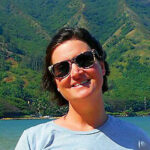Advertisement
The Boucher Institute of Naturopathic Medicine
There’s excitement in the air as you step through the solid wooden doors of Canada’s newest naturopathic college in New Westminster, BC. Or perhaps a better phrase to describe the feeling is “pioneer spirit.” For after sitting in for a day, it’s obvious to me that the students and faculty at the Boucher Institute of … Continued

There’s excitement in the air as you step through the solid wooden doors of Canada’s newest naturopathic college in New Westminster, BC. Or perhaps a better phrase to describe the feeling is “pioneer spirit.” For after sitting in for a day, it’s obvious to me that the students and faculty at the Boucher Institute of Naturopathic Medicine have struggled for the last three years to get where they are. And it’s equally obvious that the college is here to stay.
The Boucher Institute is housed in a red brick heritage building that suits the century-old history of naturopathic medicine. This fall day, I arrive in time to join the third-year students the first class ever in a planning meeting to discuss their student clinic, which opens next week to the general public for three days a week. (New patients welcome!)
But what is naturopathic medicine? Founded in North America by Dr. Benedict Lust in the early 20th century, it’s a system of health care that uses natural methods and substances including herbs, clinical nutrition, homeopathic remedies, lifestyle counselling, physical treatments and Chinese medicine to support and enhance the body’s innate self-healing powers. Naturopathic doctors consider physical, mental and emotional factors a whole-body approach. Surgery and prescription drugs aren’t used because the goal is to treat the underlying cause of disease, not just cover symptoms.
Surveys show that both the demand for and supply of natural health-care practitioners are on the rise. There are about 800 naturopathic physicians in Canada, according to the Canadian Naturopathic Association. The discipline is regulated under provincial law in BC, Manitoba, Ontario and Saskatchewan, although licensed naturopaths do practise in other areas of the country (see resources below). Until recently, those wanting to pursue this career had to travel south to one of several American colleges, or back east to the Canadian College of Naturopathic Medicine in Toronto, which is fully accredited and accepts between 100 and 150 applicants per year. Now there is another option.
The college that has evolved into the Boucher Institute opened its doors in January 2000. Named after Joe Boucher, an influential naturopathic physician in Canada, the school is a non-profit society run by a volunteer board of governors from various health and scientific disciplines. A current total of 43 students will attend more than 5,000 hours of classes, including 1,400 hours of clinic, by the time they graduate from the four-year program.
But to get to this point hasn’t been a cakewalk. In fact, the team involved with the initiative has overcome countless obstacles. A move last year to the current location. A change in ownership. Becoming a non-profit society. Attracting new students. Building a library. Finding equipment. The list goes on.
Dave Scotten, ND, has worked with the school for more than four years. He was an advisor before the school was even open and is now Dean of Education. With previous teaching experience at Bastyr University and Dominion Herbal College, Dr. Scotten’s current efforts include enhancing the Boucher Institute’s curriculum so that it’s “student-friendly, and yet provides what they’ll need [as naturopathic doctors]”.
The teachers are the “major strength” at Boucher, according to Dr. Scotten. “It’s almost a mentorship program here”, he says. “There is an incredible resource of doctors who are really good, really strong.” Another bonus: even when the school reaches maximum capacity, the aim is to keep class sizes small: between 35 and 40 students, compared to other colleges, where class size can be upwards of 100 students. This encourages hands-on learning, as well as self-awareness and personal growth, both considered to be essential requirements for exceptional naturopathic physicians.
Not only do students benefit from the facility, but so does the public and the profession as a whole. “The profile [of naturopathic medicine] needs to be raised in the eyes of the general public”, says Dr. Scotten. Now there’s another resource to help monitor the health-care industry, respond to public concerns, and support people in making informed health choices.
The Boucher Institute is currently accredited by the Private Post-Secondary Education Commission of BC, which entitles BC students to apply for student loans. The profession’s regulatory board, the College of Naturopathic Physicians of BC, voted last July to place the Boucher Institute on its list of approved schools and to endorse the college’s efforts to achieve further accreditation. The school is actively pursuing recognition and accreditation with the appropriate agencies to ensure that graduates will be able to practice naturopathic medicine in all Canadian jurisdictions that license naturopathic physicians.
“It’s incredibly exciting,” says third-year student Shelby Worts. “But there’s a little anxiety. There will be lots of eyes on us from the profession.” She’s thinking of the upcoming board exams, which will validate the education they’ve received.
“I don’t question our education at all,” says Alison Vandekerkhove, another third-year student. The classes are challenging, the workload, heavy, and the teachers, committed. Most instructors have strong clinical experience, which students feel adds a “real world” element to the classroom.
“I’ve never worked so hard in my life!” admits first-year student Nicole Robinson from Port Coquitlam. Nevertheless, she loves what she’s learning. “I can’t imagine being anywhere else.”
“I wanted to go into healing, and modern medicine is harsh, non-personal. Naturopathic medicine relates to who I am. It’s practical. It makes more sense.”
“We’re learning great life lessons that we wouldn’t learn at other schools,” adds Alison. Take the new clinic, for example. The students have done much of the work themselves painting, carpeting, decorating, fund-raising, promotion you name it.
Two things have kept the students and staff at the Boucher Institute motivated: a passion for the work, and knowing that they have growing support from the naturopathic community. Until now, the school has been funded only by student tuition. But, slowly and steadily, financial support is coming in from outside sources. Numerous naturopaths, companies and individuals have generously donated equipment, money and expertise to the school.
The students, too, feel that acceptance is on the rise, and that skepticism is slowly being weeded out. For instance, when some of them went down to Tacoma, Wash., last year for the Northwest Naturopathic Physicians Convention, they were given a round of hearty applause in front of a packed room for being brave enough to stick with a new school. It turned out that two of the conference’s keynote speakers, Peter D’Adamo and Walter Crinnion, both well-known naturopaths, were themselves part of first graduating classes at American colleges.
So what’s next for the Boucher Institute? Onward and upward to educate the next group of modern-day healers. Becoming accredited. Raising exposure for the new clinic. Establishing an onsite laboratory where students can make their own herbal tinctures and formulas.
And as for the students? Learning. Graduating. Healing.
For a referral to a naturopath, contact the Canadian Naturopathic Association toll-free at 1-877-628-7284. Naturopathic visits may be covered by provincial medical services or private medical plans.





